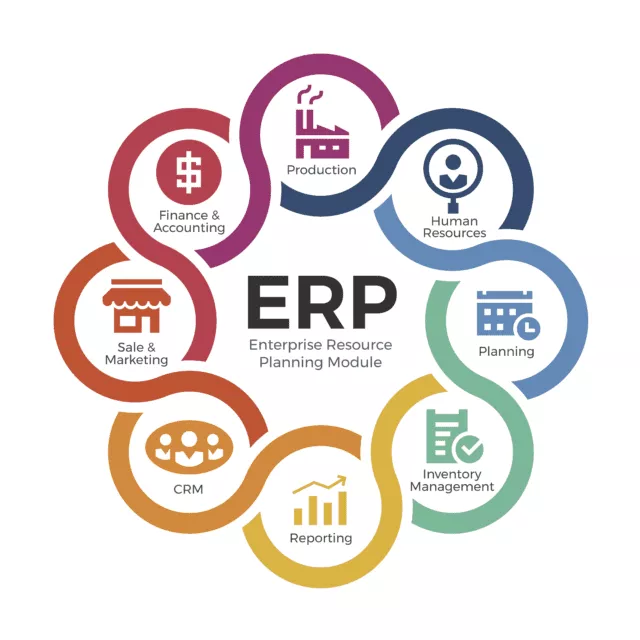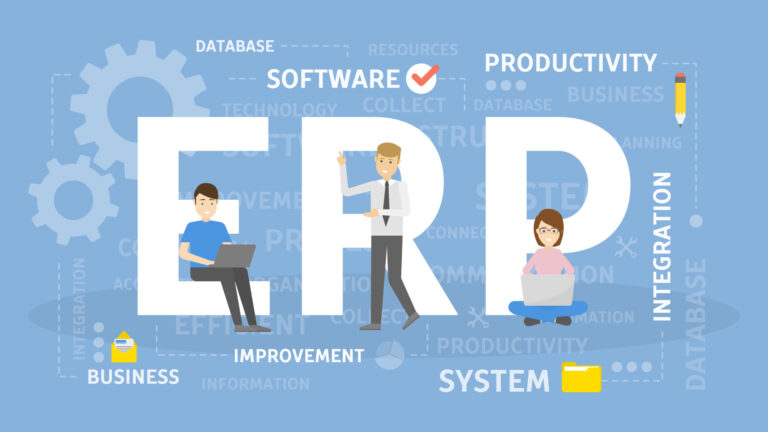ERP (Enterprise Resource Planning) systems offer organizations a wide range of business advantages. The most straightforward response to the question “what are the primary business benefits of an ERP system?” is that it brings order out of chaos.
Businesses can manage their operations more successfully and gain access to data across departments and locations with the help of ERP. Automating your back office functions and integrating all the divisions of an operation are crucial elements to achieving a Return on Investment when examining What are the primary business benefits of an ERP system. The following list will benefit you and your project team if you are involved in an ERP selection process.
- What Are The Primary Business Benefits Of An Erp System?
- Important Factors & Disadvantages About Cons Of ERP
- What Are The Advantages Of ERP Systems For Start-ups?
- What Advantages Do Erp Systems Offer To Businesses And SMEs?
- How Can ERP Boost A Company’s Business Performance?
- Considering Erp Now? Gain Freedom In The Cloud With Trek Cloud Erp
- Conclusion
What Are The Primary Business Benefits Of An Erp System?
What are the main business advantages of ERP software?
Improvements in Business Reporting
Better reporting tools with real-time information
A single source of truth – one integrated database for all business processes
Enhanced client relations
Better access to customer information
Faster response times
Improved on-time delivery
Improved order accuracy
lowered costs of inventory
Only carry as much inventory as needed, avoid these common issues
Too much inventory, and higher overhead costs
Too little inventory, and longer customer fulfillment times
Boosted Cash Flow
Better invoicing and better collections tools to bring cash in faster
Faster cash means more cash on-hand for the business
Cost Savings
Improved inventory planning
Better procurement management
Better customer service
Improved vendor relationship management
More effective data and cloud security:
Dedicated security resources
Avoid installing malicious software
Data distributed across multiple servers
Enhancements to business procedures:
Automate manual or routine tasks
Implement smarter workflows
Gain efficiency
Managing the Supply Chain
Effective demand forecasting and lean inventory
Reduce production bottlenecks
Transparency through the business
Important Factors & Disadvantages About Cons Of ERP
Costs of an ERP Software
Third-party software add-ins
Implementation costs
Maintenance
Initial and continuous training
Complex Data Conversion
Developing a solid data conversion strategy can be difficult
You have to define, examine and analyze data sources
Bad data conversion will cause delays and increased costs
Requires thorough training
The entire feature set of the ERP system must be covered during training.
ERP training sessions need to be in line with business processes
IT users need to be trained for the technical aspects of the ERP System
Time and money are spent on ERP projects, and the best ERP software implementations need to have the following characteristics:
Alignment between the business and IT
Executive sponsorship and support
Internal team leaders
Trusted external partners (consulting and software vendors)
ERP software is similar to other business technology in that it doesn’t, by itself, determine success or failure. The ROI of an ERP system is determined by the business environment, leadership, and end users, as well as the project planning, methodology, and implementation.
Why might an ERP implementation fail?
Data conversion
The process of moving data from the old system and mapping it into the new ERP is one of the biggest challenges in an ERP project.
Integrations
You should consider what other systems your ERP system needs to integrate with early on in the project and have a clear integration strategy.
People
The ERP project requires the participation of an executive as well as other crucial business leaders. Also crucial is having a communication strategy.
Training
The ERP project must include training as a key component. The new software must be easy for internal teams and end users to use.
Project planning
For an ERP implementation to be successful, planning is essential. Another essential component of success is adhering to a methodology.
What Are The Advantages Of ERP Systems For Start-ups?
While many startups and SMEs believe that an Enterprise Resource Planning (ERP) system is only useful for large corporations, in reality, both startups and small businesses can benefit from the system. ERP systems have a number of specific advantages for startups, including improved customer service, more effective business processes, and lower operational costs. Below, we’ll focus on the advantages of ERP systems for startups and how they can support and expand in a fiercely competitive market.
Synchronization Among Departments
Businesses frequently run and manage various business functions from remote locations in today’s digital business environment. In fact, managing remote business operations effectively with strong intra-function synchronization among various departments is the key to success in the modern digital era.
Startups can easily and effectively manage remote operations with a central data repository and promote departmental collaboration when a strong ERP system is integrated into the business workflow process. Data from various business functions, such as warehouses, can also be filtered and combined into a single data repository using this technology.
Managing Operating Costs
One of the biggest problems all startups encounter is a lack of funding. Any financial resources a startup has to be used with extreme care. Startups must also keep their operating expenses to an absolute minimum in order to remain competitive in the sector. Avoiding any changes in data duplication or redundancy is essential for reducing operational costs. Startups can take advantage of superior data synchronization and find any operational flaws that are costing them money by putting in place a reliable ERP system.
Decision Support Systems
One of the top advantages of ERP systems is that it enables the top management to take prompt, well-informed decisions. ERP systems enable executives and leaders to get insights into the business health and take any necessary steps with an agile approach to maintaining the competitive advantage because they come with various modules to cover nearly all essential business functions.
Faster Turnaround Time
Efficiency and productivity are virtually synonymous with enterprise resource planning (ERP). It is now simpler to have real-time insights into all business aspects and make quick, well-informed decisions based on statistics metrics thanks to the integration of a robust ERP system into the business workflow process. All of this results in greater efficiency and quicker turnaround times, which are essential to maintain the competitive advantage.

Coordination
The ERP system creates a unified data flow by integrating all essential business processes, which all operational teams with the necessary access rights can access remotely. This improves communication and teamwork between various teams, which boosts output and revenue for the startup.
What Advantages Do Erp Systems Offer To Businesses And SMEs?
By enabling SMEs and enterprises to streamline business processes and automate redundant tasks for increased productivity, ERP systems are highly valuable to these organizations. They are useful and advantageous for businesses of all sizes. Now that we’ve covered the benefits of ERP systems for startups, let’s look at some of the benefits of ERP for SMEs and businesses.
Synchronizing The Flow Of Information
In order to compete with established and large businesses, SMEs and enterprises must maintain their operational and production pace. This will only be possible with a constant and quick flow of data and information between various business functions. For example, any SME’s operational and financial functions must be integrated to guarantee the prompt release of payments and the tracking of all business transactions. Strong ERP systems allow both small and large businesses to create a single data repository for all business operations, ensuring timely information flow between all business divisions.
Increased Productivity
Through a central repository, the ERP system enables employees to work more quickly and consistently across business functions, which increases productivity and efficiency for SMEs. The ERP system maintains a record of all significant data, including vendor lists, bills of materials, operational procedures, and others, which can be accessed by all pertinent team members to establish consistency and coordination in work processes, reducing time spent on administrative tasks and boosting productivity for SMEs.
Maintaining Control And Reducing Operational Costs
For SMEs and enterprises, scaling a business is one of the most challenging tasks because it frequently necessitates stringent data control and managed operational structure scalability. Lack of adequate planning and resources causes a lot of SMEs to completely fail in their attempts to scale and grow. The ERP system is the best resource available for SMEs looking to scale their operations while maintaining complete control over them and preventing any unwelcome chaos. In contrast to more basic and ineffective tools like spreadsheets or QuickBooks, which are better suited for very small scale operations, an ERP system provides businesses with the intelligence and power of automation they need to keep up with their growing needs and handle more complex business processes, such as higher transactions and greater operational procedures. Additionally, the ERP system ensures lower operational costs for businesses, which is crucial for all SMEs looking to maintain their competitiveness and relevance in the face of domestic or foreign competition.
Greater Flexibility
The ability to adjust to changing market demands is where small and medium-sized businesses (SMEs and enterprises) stand out from the industry’s behemoths. SMEs are better equipped to adjust and shape their operations to the changing market conditions, whereas industry giants struggle to implement change across their business functions because of their clumsy operational lines and legacy systems. A dedicated ERP system provides SMEs with the additional flexibility they need to maintain adaptable workflow procedures and incorporate any modifications to data management or other business processes necessary to maintain a competitive edge.
Read about: Benefits Of Employee Engagement Survey
Long Term Planning
Keeping complete records of all business transactions is crucial for SMEs to thrive and grow. Many common budgeting tools, though, like spreadsheets or actual receipts, aren’t the best option if you’re looking for sustainability over the long haul. These procedures not only hinder SMEs’ productivity and are ineffective, but they also raise the possibility of mistakes and the loss of crucial data. Instead, when SMEs have a dedicated ERP system, they are better able to meet their data storage needs and keep up an efficient system for monitoring daily business transactions.
Intelligent Decision Making
Last but not least, the ERP system empowers top management and business leaders to make data-driven, wise business decisions. Every reputable ERP system comes with powerful reporting and management tools that give managers and executives dashboard-based real-time access to the performance of all business operations. Additionally, they are able to create interactive reports with stats metrics for every business function, enabling them to monitor the effectiveness and condition of each and take smart, data-driven decisions.
How Can ERP Boost A Company’s Business Performance?
You might require a solution that manages your manufacturing process, supply chain, and logistics, depending on where you are in the life cycle of your business. You would most likely gain from a solution that can scale as necessary. In the end, the right ERP system should assist in boosting throughput, balancing inventory in accordance with anticipated demand, and managing operational costs throughout periods of expansion.
However, more specifically, how can ERP boost a business’s operational efficiency? The following are some of the top advantages that ERP systems provide life science companies:
- Ultimate financial oversight. Cost predictability is crucial, and in order to keep costs in check, you must be aware of both the current situation and the future direction of the company. This visibility is made possible by real-time data, which also enables you to stay adaptable and make changes as necessary to lower risk and seize new opportunities as soon as they arise. An ERP system eliminates the need to convert files and allows you to access all of your reports in one location while also generating consolidated financial statements.
- FDA validation-ready environment. Any system set up by a life science company must be properly installed and configured according to strict documentation and evidence standards set by the FDA and other regulators. To save time and money during the validation process, many prepackaged ERP solutions are preconfigured to match these precise requirements.
- Quality management. Automation of supply chain transactions, tracking, and visibility are all provided by an ERP system. You can adjust production as necessary by using real-time data to spot shortages, adjustments, and other trends that could affect inventory. An ERP system offers end-to-end traceability that documents processes and unifies tracking and compliance into one dashboard. Life sciences companies are required to uphold exact specifications and track every product carefully.
- Integration inside and outside the organization. ERP excels at streamlining the commercialization process, which is necessary for product launches. With the help of an ERP system, you can frequently obtain real-time data on inventory, pricing, options, and other topics by integrating it with the systems used by your contract manufacturers, vendors, and logistics companies. You can guarantee consistent product delivery by remaining agile and gaining insight into supply and demand problems.
- Customer relationship management. By automating procedures for orders, inventory replenishment, payments, shipping, and other tasks, ERP contributes to better customer service. Data from the system can also be employed for sales tracking. If you work with group purchasing organizations (GPOs), the ERP system can also support strong oversight of contract elements like rates and administrative fee tracking.
Considering Erp Now? Gain Freedom In The Cloud With Trek Cloud Erp
Both on-premises and cloud-hosted environments are compatible with ERP. You get a safe business system that boosts productivity, even more, when you choose Trek Cloud ERP. That is a result of the system being easier to use. With a web browser, you can access the system at any time, from any location, and on any device. This enables your staff to conduct business without hiccups or delays from anywhere. Your sales teams and remote managers, for instance, can use their dashboards to access real-time data and conduct transactions.
Trek Cloud ERP is available in a Software as a Service (SaaS) model, so you’ll get a quicker return on investment. There is no need to install any specialized hardware or software. Your ERP cost is drastically decreased as a result. You can make use of your current tools. System infrastructure and system security are taken care of for you in the cloud. By choosing cloud ERP over on-premise ERP, businesses typically see
- 46% improvement in time-to-decision
- Half as much data loss and downtime as on-premise ERP
Learn more about cloud ERP to further address the question, What are the primary business benefits of an ERP system, with our article, What is Cloud ERP?
Feel free to get in touch with us if you have any questions about ERP; we enjoy doing so and would be happy to answer them.
Conclusion
So, what are the primary business benefits of an ERP system?
Financial and process optimization are important when a young company starts to expand and starts looking for new ways to boost profits. Make the case for purchasing an enterprise resource planning (ERP) system once you have a basic comprehension of the problems facing your organization. Cloud-based ERP makes a lot of sense in today’s business environment because it helps eliminate redundancy while providing greater visibility into all areas of the business. An increasing number of employees are working remotely at least part of the time.
What then are the main business advantages of ERP? Simply put, the system can handle mundane tasks so you have more time to concentrate on the bigger picture.
The majority of Fortune 500 companies and thousands of small and midsize businesses both use ERP systems, which have been around for a long time. An ERP platform can help any company that oversees sales and accounting for its products or services as well as manages its employees, processes, products, or services.
An ERP system can help life sciences businesses not only streamline operations but also adhere to regulatory standards and keep meticulous financial and product life cycle records.





